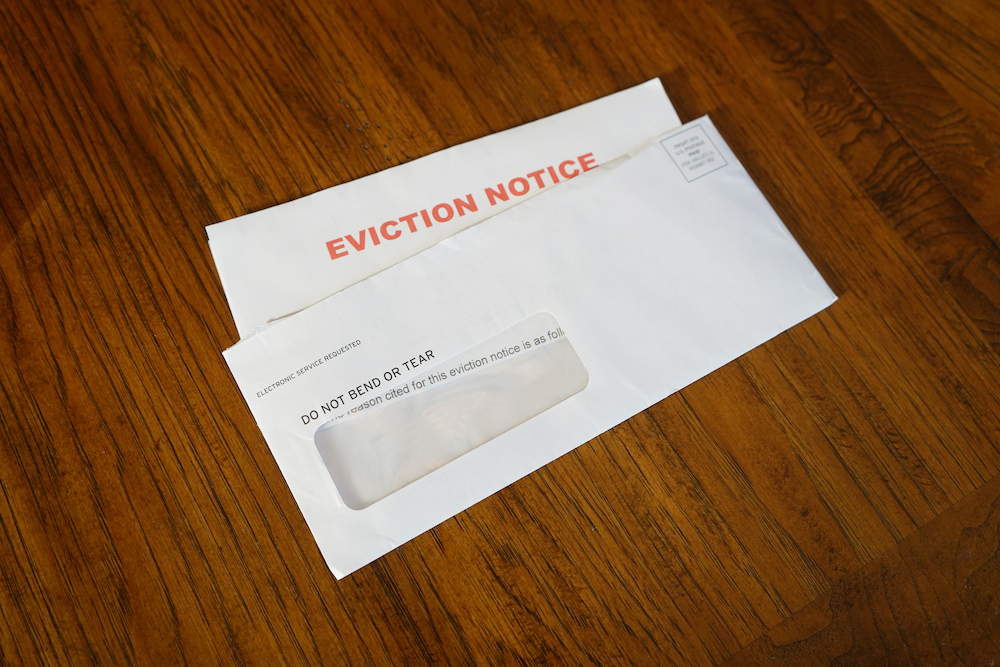
by Kim Pidgeon | Oct 13, 2023 | News
Aim of partnership is to re-engage residents before homes are lost
Sovereign Network Group (SNG) is working with housing and homelessness charity Shelter on a new initiative to prevent avoidable evictions due to ‘non-engagement’ in social housing.
Shelter will support customers to re-engage with the housing provider with the aim of reducing avoidable evictions.
The partnership follows the publication of a 2021 Shelter report which cited ‘non-engagement’ as one of the leading cause of evictions from social housing.
The initiative, which when trialled in Devon proved so successful with more than 75% of people re-engaging, is now being rolled out across the South and South West of England.
As a result, SNG will be able to refer customers who live in these areas, and who choose not to engage, to Shelter.
As an independent, Shelter will work with both housing provider and tenant to build a positive relationship and support customers to re-engage. It will also help to resolve any disputes and ensure that both parties understand their rights and responsibilities.
While the specific strategies used by Shelter will vary depending on the local context and the needs of the customer involved, they will actively reach out to customers who have been hard to contact to make them aware of the full range of support available from the housing provider. This includes help finding employment, debt advice and details of grants which may be available.
Advisers will make contact using a variety of channels such as phone calls, emails, letters, and in-some cases home visits. Once referred, customers will have access to further resources including financial counselling and housing advice.
SNG say the goal of the new partnership is to create an environment where customers feel comfortable reengaging, leading to improved living conditions, increased tenant satisfaction, and ultimately, more stable tenancies.
Jon Cox, head of tenancy sustainment at SNG said: “We recognise that sometimes no matter how hard and sensitively we try customers may feel overwhelmed and unable to communicate with us when tenancy issues arise.
“As one of the first initiatives of its kind in the sector, this partnership will support our customers to live well and sustain their tenancy when they otherwise may not be able to.”
Stuart Francis-Dubois, strategic lead at Shelter said: “We’re delighted to announce our partnership with SNG, aimed at providing invaluable support to some of their tenants during their times of need.
“By offering free, independent legal advice, we want to help people navigate their housing challenges and ultimately preventing evictions. Together, we are committed to making a positive difference in the lives of SNG’s tenants.”
SNG is funding the partnership over a two-year period and expects to support approximately 150 people in the first year. Subject to this year one performance, SNG will then look at rolling out the service to other areas.
New figures released from the government reveal £1.7 billion has been spent by local councils on temporary accommodation for homeless households in England in between April 2022 and March 2023 – a 9% increase in spending from the year before and a 62% increase in the last five years.
One third of the total was spent on emergency B&Bs and hostels.

by Simon Fitzsimmons | Apr 29, 2022 | News
Between October and December last year 5,260 households were threatened with homelessness in England as a result of a no-fault eviction, new government figures reveal. A 37% rise compared to the same period before the pandemic.
A Section 21 no-fault eviction allows landlords to evict a tenant with just two months’ notice, without having to give any reason.
In April 2019, the government announced that “private landlords will no longer be able to evict tenants from their homes at short notice and without good reason.” Since then, Shelter points out: the government has recommitted to scrapping Section 21 no-fault evictions in the last two Queen’s Speeches.
The housing justice charity wants the government to put their words into action by committing to a Renters’ Reform Bill in the Queen’s Speech next month. Shelter argues that bringing in this clause is now more urgent than ever as the cost-of-living crisis means many renters will be unable to cover the unexpected costs of having to find a new home, including putting down a deposit or paying rent in advance.
To be classified as ‘threatened with homelessness’ by the council, a household is at risk of losing their home in the next eight weeks.
Data from the government on homelessness also reveals a quarter of households were found to be homeless or at risk of becoming homeless because of the loss of a private tenancy (14,820 households). This has increased by 85% in a year after the end of the eviction ban during the pandemic but is 14% higher than before the pandemic. The loss of a private tenancy is the second leading trigger of homelessness in England.
Further data reveals: the number of people fleeing domestic abuse (8,200 households) who have become homeless or threatened with homelessness is 28% higher than before the pandemic. A total of 33,800 households became homeless in England last winter. This includes 8,410 families with children – a rise of 18% in a year and puts family homelessness back at pre-pandemic levels.
According to Shelter’s own research with YouGov, in the last three years, nearly 230,000 private renters have been served with a formal no-fault eviction notice. This equates to one renter every seven minutes.
Polly Neate, chief executive of Shelter, said: “Homelessness due to no-fault evictions is up 37% on pre-pandemic levels. These are real people who’ve been chewed up and spat out by our broken private renting system, and now face an uphill battle to find somewhere to call home again.
“Our emergency helpline is inundated with calls from people whose lives have been thrown into chaos by unexpected and unfair evictions. If landlords follow the process, as it stands they can turf people out of their homes for no reason – and tenants are powerless to do anything about it.
“No fault evictions are blunt, brutal and indiscriminate. England’s 11 million private renters have waited long enough for a fairer system – it’s time the government brought forward a Renters’ Reform Bill and put Section 21 on the scrapheap where it belongs.”

by Simon Fitzsimmons | Jan 29, 2022 | News
A pilot scheme spearheaded by housing and homelessness charity Shelter and Network Rail staff at Manchester Piccadilly and Birmingham New Street has so far helped 316 people sleeping rough around the major transport hubs. The partnership has been operating for the past year to help find a route out of homelessness for people who are living on the streets around the stations.
Through the pilot, station staff have been specially trained by Shelter to connect and refer the people they encounter sleeping rough for tailored help and support.
Interventions by the outreach staff in the stations can be a first step in the process to securing settled accommodation and life-changing support for people living on the streets, some of whom have been sleeping rough for a long time.
The help includes support to access essential services, such as registering with a GP, mental health services and setting up a bank account, as well as support to access accommodation.
From the 316 people helped, 15 have secured settled housing, and another 135 have been helped into temporary accommodation. 100 people were registered with a GP and 64 were helped to set up a bank account. Other help included securing identity documents, accessing benefits/ financial support and access to mental health support
One of the people helped was Ryan, 40, who had been sleeping rough around Birmingham New Street station for four months during the pandemic. Through the pilot he was supported by Shelter with a number of issues, including addiction, and is currently living in supported recovery accommodation.
Ryan said: “This time a year ago life was very different, and I remember feeling like there was no way out. But since that first ‘hello’ at the station, things have only got brighter.
“When the engagement workers reached out it felt like someone had thrown me a lifeline. I was given options that I never knew were even available to me, and they supported me every step of the way. Thanks to them I’ve not only got a safe home, but also a chance to see my daughter. For the first time in years I have hope for the future.”
The pilot will also see the opening of a new dedicated welfare room for the outreach project at Birmingham New Street station. The room will give those seeking help a private space to have a hot drink and somewhere comfortable to sit down and speak to engagement workers and station staff, away from the hustle of the station concourse.
It’s thought to be the first dedicated room of its kind at a British railway station. A similar welfare room at Manchester Piccadilly is due to open in the coming weeks.
The initiative is now entering its second year with the aim of finding settled housing for even more people on their journey out of homelessness.
Tim Shoveller, Network Rail’s North West and Central region managing director, said: “It’s fantastic to see the real impact this outreach scheme has made to lives like Ryan’s and dozens of others in both Manchester and Birmingham, and the opening of the new welfare rooms.
“Before this partnership between Network Rail and Shelter, station staff often felt powerless because they didn’t know how best to help those without a safe and secure place to sleep for the night. Ryan’s success shows how equipping railway workers with the knowledge and skills to help people find a route out of homelessness can really turn lives around.”
Vicky Hines, Birmingham Shelter Hub Manager said: “These pilots have shown us all what is possible when we come together to support people who find themselves sleeping rough. Someone knowing they’ve got options and don’t have to face homelessness alone can change their life forever.
“The station team’s commitment has been inspiring, and we’re really proud we’ve been able to empower them to help hundreds of people in and around the stations. In the second year of our partnership with Network Rail, we hope to offer even more people a route out of homelessness.”
The Shelter Outreach project forms part of Network Rail’s five year ‘Routes out of Homelessness’ campaign.

by Kim Pidgeon | Sep 28, 2019 | News
New research from Action on Empty Homes reveals the fastest rise in the number of long-term empty homes in England since the recession.
An additional 10,983 homes were left empty in 2018 – an increase of 5.3 per cent, which is more than double the 2.6 per cent rise seen in the previous year. The new figures mark the second consecutive year with a substantial increase in the amount of long-term empty homes, reversing the previous trend of steady declines seen since 2008.
Across England there are now more than 216,000 long-term empty homes, equivalent to 72 per cent of the government’s annual new homes target.
The report shows empty homes occur in all Council Tax bands but are particularly prevalent in the highest band (Band H) and in the lowest band (Band A). It also reveals the increase in long-term empty homes is not limited to one area of England.
Two thirds of the country’s 326 local authorities are experiencing a year-on-year uplift. More than a third of local authorities are seeing uplifts greater than 10 per cent; while more than one in ten is witnessing an increase of 30 per cent or more. Five local authorities including Portsmouth, Southwark and Hartlepool have all seen surges of more than 50 per cent.
The analysis says the increase in empty homes is being driven by the end of the Coalition Government’s Empty Homes Programme, which finished in 2015. It had used several targeted funds to invest £216 million in bringing over 9,000 long-term empty homes back into use. The recent slowdown in the housing market is also a factor.
The report makes recommendations for tackling the issue, including a national investment programme targeted at areas with high levels of long-term empty homes; re-establishing dedicated funding programmes to support local authorities and housing providers to create affordable housing from long-term empty homes in all parts of England; and supporting community-based regeneration approaches.
Reducing the number of empty homes also has huge cross-party parliamentary support. A ComRes poll of MPs commissioned by Action on Empty Homes shows that 72 per cent of MPs polled rank action on empty homes as one of their top two priorities for combating the current housing crisis. More than 80 per cent supported targeted funding for local authorities, charities and local organisations to buy, lease or refurbish empty homes.
Will McMahon, director of Action on Empty Homes, said: “With homeless numbers at their highest levels in over a decade, it makes no sense to leave hundreds of thousands of homes standing long-term empty. Like the housing crisis, empty homes are a national problem, two-thirds of councils have rising numbers. National problems need national solutions.
“The Government must provide a solution for every street in Britain. Significant investment is needed to turn around communities that have faced under-investment for decades, and all local councils need new powers to take action. England’s 216,000 empty homes are everyone’s problem and everyone’s opportunity. The time for action is now.”



